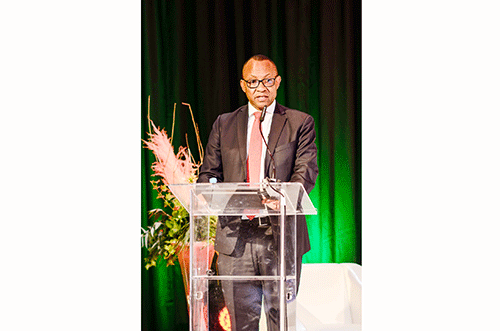Namibia Chamber of Commerce and Industry president Bisey /Uirab yesterday said there is a trend emerging of developed countries that favour and actively promote protectionism and regionalism.
“For smaller open economies like
Namibia, this is a worrying development. It is observed that geopolitics is becoming a factor in investment attraction and international trade. So, it is not surprising that countries, regions and economic groupings and
trade blocks are closing ranks to stimulate production and thereby offer a degree of protectionism to enterprises,” he said during the inaugural State of Business Address (SoBA) in the capital.
/Uirab added that this is being done in various ways and includes among others, policy changes, fiscal assistance, and concluding bilateral to multilateral agreements.
According to him, Namibia is sailing in turbulent waters, and there is a need to adopt a collective approach to navigate stormy waters.
The SoBA, which is now intended to be an annual national address, was held under the theme ‘Private Sector’s Ordeals and Triumphs – Paving a Way for Public – Private
Partnership’.
The aim of the event is to ensure a collective private sector approach to demonstrate the urgency of the challenges and strategically
influence actions, decisions or appropriate policy reform. Further, it aims to act expeditiously and diligently on matters affecting productivity, investment, trade and entrepreneurship in the country.
The NCCI president stated that Namibia will fail in its endeavour to grow the country’s economy unless the focus is on skills development and technological innovation. In parallel, this requires business-friendly policy measures that will support the integration of new sectors, he added.
Furthermore, /Uirab stated some challenges that are affecting the growth of the business sector, noting that access to policymakers on time, every time tops the list.
“Turbulent times require timely decisions. Representatives of economic sectors regularly voice concerns about
the unavailability of policymakers and public officials to engage and also about their non-responsiveness to written communication. This is not the behaviour one expects and the NCCI calls for immediate remedial action,” said a concerned /Uirab.
Another challenge he outlined was the budgetary allocation to the productive economic sectors which, according to him, remains inadequate, citing the trade and agricultural ministries.
In the list was the beef sector fragmentation which is not in the interest of Namibia and undermines the potential to penetrate markets and adequately service existing markets. Another challenge is the availability of serviced industrial land and access to units at government business parks and incubation centres are one impediment that has been allowed to linger on for far too long without redress.
Additionally, /Uirab shared some recommendations that government has to tap into. He noted it is important that institutional, effective communication forums be established, and local procurement laws and regulations must be improved and broadened to include local content policy frameworks to increase local participation in emerging sectors such as green hydrogen and fossil fuel.
Also weighing in, the head of research at High Economic Intelligence Salomo Hei said Namibia needs to bring policy certainty into play, and the economy needs to change its structure and develop the manufacturing sector.
At the same event, Piet Gouws, president of the Namibia Agricultural Union, said Namibian beef was able to reach niche
and lucrative markets in Norway and Europe, among others, and Namibia exports 70% of its livestock products.
However, Gouws noted that the northern communal area has a huge potential for a commodity trade base that can be exported.
“We must not think that the northern communal area has been neglected; it is just opening in time because of the low volumes that we produce. We need to have sustainability in the market otherwise we cannot deliver to that market,” he explained.
Agriculture, Water and Land Reform minister Calle Schlettwein earlier this month urged the incoming board of directors at the Meat Board of Namibia to consider equalising market opportunities and prospects of farmers for the entire country, including for farmers north of the contentious Veterinary Cordon Fence, also known as ‘the redline’.
Schlettwein cautioned the incoming board that the issue of the redline needs to be urgently addressed.
“The split between the commercial disease-free livestock sector south of the redline and the communal sector north of it, where diseases are still prevalent, in our opinion, is an ugly remnant of the divide and rule strategy of colonial powers, which needs to be addressed – and it is one of the focal points that the meat board must take on,” said the minister in the capital at the inauguration of the new board.


